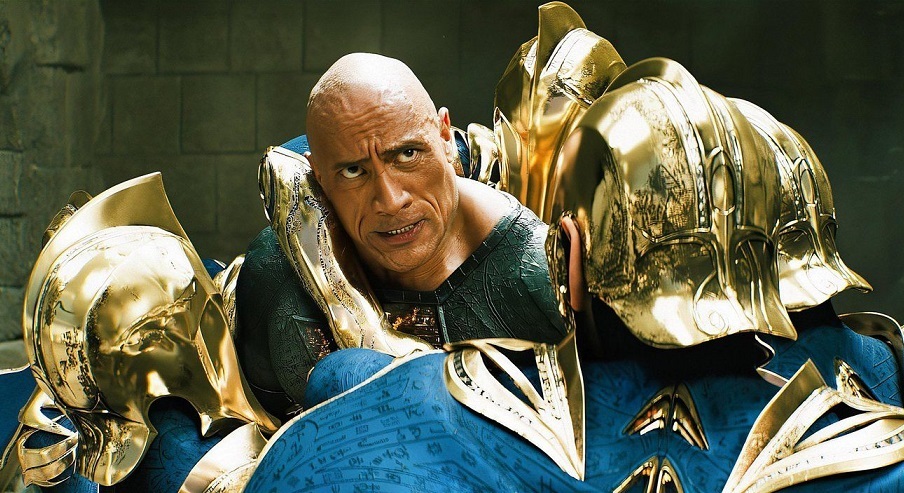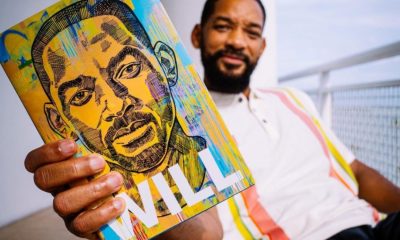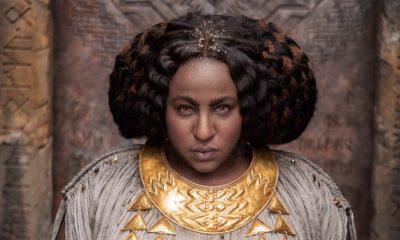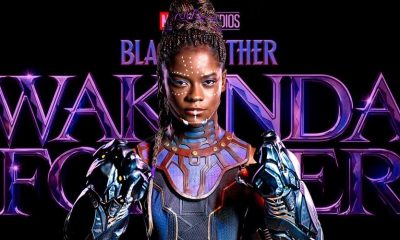VIEWPOINT
#SeunSays: Sometimes the best ‘superhero’ films aren’t superhero films
Published
2 years agoon
By
Geek Afrique
In a heartfelt piece, a die-hard geek, author – and regular-ish new columnist for GeekAfrique – shares his views on ‘The Batman’.
Seun Odukoya
After watching comic-based movies for over thirty years, I can confidently say the best superhero films are sometimes not ‘superhero’ films. They are simply genre films featuring people with special abilities. Case in point: ‘Captain America: Winter Soldier’, ‘Logan’, and now ‘The Batman’.
DC needs to learn to keep a lid on their casting choices, or maybe not. At this point, people ranting and screaming at the heavens because of Batman and related characters casting choices is nothing new. Hey, I ranted at Heath Ledger’s casting as Joker, but I learned my lesson. So, when Batfleck’s turn came about, I held my peace. The result? An incredible performance that didn’t get its time in the spotlight.
We all know the story: personal issues interfered with the original plan to have Ben Affleck direct and star in a standalone Batman movie that would have had Deathstroke as the main villain. That would have been insane, as both characters are known for their physicality and combat abilities. Besides, the warehouse scene in ‘Dawn of Justice’ gave me one of the several things that had been lacking from live-action Batman films: A Batman who can actually fight.
Another thing that has been so conspicuously absent in the movies is actual detecting. For a character hailed as ‘the world’s greatest detective’, to the point where one of his deadliest and oldest rivals refers to him like that, the movies have failed in that regard. Until now. ‘The Batman’ is your standard mystery crime thriller; someone is running around Gotham murdering the rich and privileged (aka the corrupt). He leaves breadcrumbs for the police and a certain vigilante to find – or the tail end of a rope for them to tug on, and thereby unravel the biggest corruption scandal in Gotham since…well, since forever.
The vigilante in question has been around for roughly two years, and his methods still need work. The most obvious is the fact that there’s no clear distinction between the mask (Bruce Wayne) and the man (Batman) yet. Bruce broods, Bats broods. Bruce is obsessive, so is Batman. He seems to be tottering on the edge of complete insanity, needing ‘one little push’ to completely lose himself. And somewhere on the fringes is Batman’s batman, hovering, unsure of his place in the ungodly mess that is his charge.
Gotham itself is a city devouring its own tail. It is gloomy, seedy, with the sun barely seen during the 176-minute runtime. Bruce himself provides the narration for some of the film, providing context and exposition. Zoe Kravitz’s Selina Kyle is a pleasure to watch – something even Bats acknowledges in one of the ‘that was weird’ scenes. The character can be fun, but much of that cannot be had in this joyless movie. Her bisexuality was introduced – but we weren’t beaten over the head with it. And both the stars have on-screen chemistry in abundance, sparks and hearts flew off the screen every time The Cat and The Bat shared a scene. I do like how their relationship is teased but not explored too deeply.
Matt Reeves’ ‘The Batman’ is good for many reasons. The dialogue is excellent: James Gordon is more visible here than in any other movie version, though he seemed more like Bats’ sounding board than his own man. It’s always nice to see the more human members of Bats’ rogue’s gallery – Falcone, Maroni; Collin Farrell virtually disappears into his Penguin, sounding like an early-days Robert DeNiro knock-off. Gil Colson is supposedly Harvey Dent’s forerunner – and Peter Sarsgaard plays him like a college teenager on a first date with his crush. Alfred is the guardian who is confused about his ward’s choices but loves him nonetheless. And a bonding moment promises a closer relationship between the two, which will probably lead us to the Alfred we all know and love.

‘However, it is worth mentioning that it’s as though Reeves looked at Nolan’s trilogy and upped the ante.’
I couldn’t help but notice how Reeves draws parallels between Batman and the Riddler. They both stalk people, embrace theatricality, and keep meticulously detailed ledgers. And Riddler did admit to being inspired by Bats. If only he knew. The Riddler, whose name has somehow become Edward Nashton is played to perfection by Paul Dano, who I have thought of as ‘disturbed’ for a while. I’ve always found his babylike face creepy, and he dials it all the way up with growls and grunts and sudden screams.
Pattison’s Batman realizes he still needs a lot of work; this is clear for all to see when at the climactic moment, he is made to realize running around a city in black and calling himself ‘Vengeance’ may not be the smartest choice. I’m not even going to talk about the bike, the Batmobile, the gadgets, and the functionality of the Batsuit. However, it is worth mentioning that it’s as though Reeves looked at Nolan’s trilogy and upped the ante. And the cinematography? ‘The Batman’ is a lovingly and gorgeously-shot movie, frame by frame. Several shots feel like a picture come to life, symbolism running rife within. Greig Fraser (of ‘Dune’ fame) deserves an Oscar for this one.

‘If I could offer Reeves some advice though, it would be to LEAVE JOKER ALONE. Everybody has a narrow view when it comes to Batman and his rogues’ gallery, as though Joker is the only villain he has.’
If I could offer Reeves some advice though, it would be to LEAVE JOKER ALONE. Everybody has a narrow view when it comes to Batman and his rogues’ gallery, as though Joker is the only villain he has. Reeves did a great job with Riddler, now do some other guy, like the Ventriloquist, Ra’s Al Ghul, Killer Croc, Clayface, the Mad Hatter, Hugo Strange, Black Mask, Calendar Man, Lady Shiva, or the Court of Owls. See the point there?
‘The Batman’ may be a hard sell for ‘regular’ moviegoers who only know Steve Rogers because they’ve seen ‘Avengers: Endgame’, and people who are not true movie buffs may find it long and boring. But anyone who watches with an open mind is guaranteed to be entertained. After all, is that not why we’re here?
Seun Odukoya, author of ‘Saving Dapo’, lives and writes in Lagos.
TV
Review: ‘House of the Dragon’ hits stride in bigger, bleaker season 2
Published
1 month agoon
June 14, 2024By
Geek Afrique
The first season of “House of the Dragon,” HBO’s prequel to “Game of Thrones” and the first spinoff in network history, was widely considered a success. But it was also, in essence, 10 hours of set-up, speeding through decades of context to take audiences to the brink of the Westerosi civil war known as the Dance of the Dragons. Despite its many strengths, the show began as a structural oxymoron: too rushed to do the patient plotting and character-building that gave its parent show such a strong foundation; too slow to sink its teeth into the real meat of its story until the final stretch of episodes, which saw the death of King Viserys (Paddy Considine) and the formation of factions around his two potential heirs.
In Season 2, “House of the Dragon” feels like it’s finally the show it was always meant to be. What all that runway was leading up to, it turns out, is a tragedy of epic proportions, bleaker than even the famously violent and cynical “Game of Thrones” could ever dream. In the war between two scions of the long-reigning Targaryen clan, there are no winners, least of all the realm each contender hopes to rule.
The new episodes, four of which were screened for critics in advance, contain much of what their predecessors lacked, from the development of key relationships to the dragon-on-dragon violence promised by the title. “House of the Dragon” has been elevated, sharpened, and broadened in scope — all in service of a show now as dark figuratively as it already was literally.

Showrunner Ryan Condal and co-creator George R.R. Martin, the author of the series’ source material, could barely cram all the political and personal context for the Dance of the Dragons into a full season of primer. But at the start of Season 2, the combatants are helpfully sorted into color-coded contingents: the Blacks, loyalists to Viserys’ eldest child Rhaenyra (Emma D’Arcy), and the Greens, who back Rhaenyra’s half-brother Aegon (Tom Glynn-Carney), the progeny of Viserys’ second marriage to Rhaenyra’s childhood friend Alicent Hightower (Olivia Cooke).
For what it’s worth, the show’s sympathies are clearly skewed toward the Blacks. Rhaenyra’s succession claim is contested, in part out of rank misogyny, and in last season’s finale, she suffered the first true loss of the war when Aegon’s sadistic, vindictive brother Aemond (Ewan Mitchell) killed her young son Lucerys (Elliot Grihault). Yet the thematic gist of “House of the Dragon” is that, once the bodies start to fall, sympathy ceases to matter in the face of a self-perpetuating cycle of destruction.
From the very first shot, Season 2 signals an intention to widen its lens beyond the palace intrigue among a single blended family in a couple of castles. We open not in King’s Landing or on Dragonstone, but at Winterfell, the seat of the Stark family whose own dissolution formed the spine of “Game of Thrones.” The point of the excursion north isn’t just to highlight historical parallels; it’s to indicate that “House of the Dragon” is shifting its focus from the intimate dynamics of the Targaryens to their disastrous, continent-spanning consequences. “When princes lose their temper,” one character warns, “it is often others who suffer.”

The point is bluntly put, and only reinforced by grim spectacles seemingly designed to refute the apocryphal Truffaut quote that there’s no such thing as an anti-war film. (Or TV show with the budget of a box-office tentpole.) A dispute between two squabbling teens cuts directly to a battlefield strewn with corpses; a humble family in a blockaded city worries over the spiking price of food. These exchanges take place not between our primary antiheroes, but minor, even anonymous, characters we may never hear from again. Cumulatively, they stand in for the masses who stand to gain nothing from two sides armed with the magical equivalent of nuclear bombs engaged in mutually assured annihilation.
This thread builds on longstanding themes of the “Game of Thrones” universe. (Martin’s original “A Song of Ice and Fire” novels made clear that armies on all sides, no matter how righteous their commanders’ cause, will engage in petty atrocities like rape and theft if given the excuse.) There’s still an added sense of futility to “House of the Dragon.” Ned Stark may have been naïve, but there was a clear-cut morality to his initial search for truth that’s less applicable to Rhaenyra, a flagrant philanderer — just like Ned’s adversary Cersei Lannister! — who clings to her birthright primarily out of personal grievance. And as the war ramps up, cooler heads in both camps are gradually sidelined in favor of bloodthirsty hard-liners like Aemond and Rhaenyra’s uncle/husband Daemon (Matt Smith), whose one-upmanship makes peace an increasingly certain impossibility. “Soon, they won’t even remember why they started the war in the first place,” Rhaenyra’s aunt Rhaenys (Eve Best) laments.
One of the even-tempered types on the losing side of this fictional history, Rhaenys was once passed over for the Iron Throne herself. She’s lived long enough to see history repeat itself, and the viewer brings their own knowledge of what’s coming generations down the line.
That future, of course, includes a horde of ice zombies coming for a kingdom left without the dragons who serve as its best defense, a near-extinction directly tied to the Dance and its winged casualties. At first, I balked at how “House of the Dragon” retroactively turned dynasty founder Aegon the Conqueror into a prophet passing his apocalyptic dream down through the generations. But in Season 2, this device effectively underscores the damage war will do. Rhaenyra claims to be acting with the prophecy’s predictions in mind; in reality, she’s only guaranteeing they come to pass.

The oppressive mood can make “House of the Dragon” a trial to watch, albeit in a way that’s a testament to its power. (Any show that gives you bad dreams, as these episodes did for me, has thoroughly bored its way into the subconscious.) There are occasionally challenges to the show’s cultivated sense of reality, like the patently absurd idea that the 30-year-old Cooke is a grandmother.
But for the most part, the broad-based empathy “Game of Thrones” cultivated for its many protagonists is here deployed to explain what could lead otherwise sensible people to murder their family members in cold blood, and honestly believe they had no other choice. It’s a worldview rarely illustrated at this scale. Most blockbusters need a happy ending to bring in the crowds. Having made a saga where blood flows freely and incest is normalized the biggest draw on TV, “House of the Dragon” feels no need to spare our feelings.
‘House of the Dragon’ Season 2 will premiere on HBO and Max on June 16 at 9 p.m. ET, with remaining episodes airing weekly on Sundays.
VIEWPOINT
#SeunSays: Black Adam is the film DC sorely needs, but is it the one the people want?
Published
2 years agoon
November 1, 2022By
Geek Afrique
Our columnist takes a look at the latest offering from the DCEU, as well as its impact on the troubled studio’s efforts.
By Seun Odukoya
SPOILER ALERT: If you have not seen DC’s Black Adam starring Dwayne Johnson, do not proceed beyond this point.
Clear? Good.
Between you and me, I actually predicted the mid-credit scene – right down to Superman saying ‘we need to talk’. Honestly. I said it could go one of two ways: 1) Waller asks SHAZAM for help and he says ‘I know a guy’. Of course, we all know the guy he knows is Superman, or 2) she asks Affleck’s Batman.
You know what my choice would be. And, you know the one we actually got.
But that’s neither here nor there. I only mentioned that to establish that I get these movies. Of course, if the first book you read in your life was a comic, you’d probably be just like me.
Predictably, Black Adam opens with the ‘5000 years ago in Khandaq’ pseudo-origin narrative, introducing the tyrant king and oppressed people classically narrated in voice-over. Quickly, we come to present Khandaq, where not a lot has changed. The people are still being oppressed, but this time by white-skinned terrorists. The people don’t do much but sneak around and speak of the ‘people’s hero’ who violently liberated them all those years ago.
Cue the music. Enter Black Adam.
You already know the story; an oppressed people need a hero and someone steps up. He is granted immense power and challenges the tyrant. In the ensuing melee, they are both destroyed and the hero is never heard from again. Only this time, the hero is really not the hero we thought he was.
Sylvester Stallone’s SPARTAN, anyone?

Honestly, apart from Dwayne’s furrowed brow, there’s a lot to like in this movie. There’s the initial ‘I’m-a-bad-guy-so-I-speak-sparingly’ version of him, which quickly gives way to the ‘I-like-the-sound-of-my-voice-so-shrug’ version – which we’re more used to. There are the well-planned fight scenes, which, much like Snyder’s, play to each character’s strength. There’s the inexplicably f**king rich Hawkman who lives in a house with its own underground hangar – much like the X-Mansion – and walks with a swagger that seems to say ‘I want to be Chadwick Boseman playing Black Panther so bad’. He’s a cool character – if you excuse the fact that, apart from ‘world peace’, he really doesn’t have much of a motivation. There are the Gen Z representatives: Cyclone, who seems to just be eye candy, because, despite having an IQ of 167, she wasn’t of much use and Atom Smasher who seemed to be the brand endorsement guy. I mean, tell me you missed the KFC bucket.
The show-stealer of this experience is the ever smooth ever suave Pierce Brosnan, who I have a sort of love-hate relationship with. I didn’t like his Bond, and I still don’t. But that charming rogue he played so well in The Thomas Crown Affair? Perfect.
The show-stealer of this experience is the ever smooth ever suave Pierce Brosnan, who I have a sort of love-hate relationship with. I didn’t like his Bond, and I still don’t. But that charming rogue he played so well in The Thomas Crown Affair? Perfect.
Brosnan absolutely crushed it as the world-weary Kent Nelson who has one foot in the future and would rather be anywhere else than right there. The curse of being someone like Wolverine is outliving everyone you love. It’s several times worse for Nelson because he lives through it over and over again – right until it actually happens. Of course, you know there’s a scene in this movie that mirrors the one-finger scene in Avengers: Endgame.
Of course, I write ‘of course’ a lot.
Of all the characters in this movie, Dr. Fate is absolutely the one I want to see again. As much as they showed his range, I still feel as though there’s so much more to do with him. He brought gravitas and a much-needed emotional grounding to the film, which all the heavy-handed melodrama couldn’t accomplish. And we haven’t even touched on Inza.
Of all the characters in this movie, Dr. Fate is absolutely the one I want to see again. As much as they showed his range, I still feel as though there’s so much more to do with him. He brought gravitas and a much-needed emotional grounding to the film.

The film has its share of jokes and one-liners, and in this movie, it actually fits perfectly within the dark tone (unlike a certain ‘Joss-tice’ League) without coming across as cheesy or forced. There’s a scene in which Black Adam wakes up after being knocked out by an Ethereum rocket and The Good, The Bad, and The Ugly plays on a TV. And then, an action sequence minutes later mirrors the quick draw scene – and we never see any reference to that again.
Let’s just ignore the fact that we’re not any further enlightened about Ethereum or Nth Metal by the end of the film, neither do we have an explanation of why the child Amon is not afraid of Adam or of why Adam can speak perfect English within moments of awakening. This is a really good DC film and heralds a positive direction for the company moving forward. Whether the audience, who are apparently used to seeing family-centered Marvel goofiness will give it a chance remains to be seen.
Time will tell. Or, as in this case, box office receipts will.
Odukoya lives, and writes in Lagos.
VIEWPOINT
#BookChaser: Inside a writer’s residency experience
Published
2 years agoon
October 11, 2022By
Geek Afrique
I love that home-away-from-home treat, or simply give me a hotel room with the whole works. Now that’s, maybe, close to what a residency programme can give you. In this case, it’s the Ebedi International Writers Residency.
By Nathaniel Bivan
In 2018 or 2019 (I’m not sure now) I got an email directly from Prof. Wale Okediran informing me of my selection as one of the fellows for the Ebedi International Writers Residency which takes place in Oyo State. Wow!
If you know anything about the Ebedi residency, or any writer’s residency at all, you would know that this would have meant quality writing time in a cool and, yes, writer friendly environment.
Long story short – I never made it to the residency. This is why when Nosakhare Collins, poet, documentary photographer, and Director of Libretto Publishers made the list for the August/September 2022 batch, I became instantly curious about his experience and thought it would be a wonderful thing to share.

I must pause here to appreciate Prof. Okediran for this wonderful initiative that has been consistent since its debut in 2010 till date. But for those who know little or nothing about him, there’s more.
He served as a Member of the Nigerian Federal House of Representatives from 2003 to 2007. Okediran has about fourteen novels to his name, including Tenants of the House, a fictional account of his years in the House of Reps. There’s more, but I’ll stop here.
So, yes, I got in touch with Nosakhare who happens to be a bit of a long-time literary acquaintance back in the day when my main focus was chasing after and interviewing writers and anyone related to the arts.
When Nosakhare learned that he was selected as one if the 2022 fellows, he was overtaken by excitement considering the application process took long before Okediran reached out to him.
“For a brief moment, I was in disbelief. Then I was elated when the news finally sunk in. It was an incredible feeling, one I’ll never forget, because it’s a privilege only a few writers have experienced,” he said. “Ultimately, the overriding feeling afterwards was an overwhelming sense of gratitude. I’ll always be grateful for this opportunity.”
And there’s good reason for this. The application process was tedious for Nosakhare because he had to seek two recommendation letters. Then he had to wait for over three years. “Because I made my submission circa 2019,” he pointed out, “before I could get an invitation letter from the patron. It was more a thing of hope than an expectation for me. I never lost hope that it would get to my turn one day. As they say ‘life na turn by turn’. Without being political, I guess now is my turn.” (Laughs)
So now he’s at the residency (note: This discussion took place while he was still in residence). But would he say his expectations were met? He responds that being selected is in itself an expectation met and that anything that comes after that is a bonus.
“I don’t feel entitled to any kind of fantasy or desire. I just want to write in an environment that allows me the creative boost I need while enjoying the experience of being a writer. I’m also looking forward to interacting with other writers and exchanging stories about the writing life.”
“I don’t feel entitled to any kind of fantasy or desire. I just want to write in an environment that allows me the creative boost I need while enjoying the experience of being a writer.”
Exactly! Who would argue with that? Not me.
“So far, Ebedi has served me well with what I wanted to achieve, though not all yet. I have a purpose for being here and it’s my intention to achieve that purpose before the end of the Residency. Ebedi has offered me family while staying in the house with other amazing writers – the interactions and dialogue about writing have been both insightful and inspiring. I’m eager to use some of these interactions to expound my creative writing goals,” he continued.
Now to the big question. And here’s his answer already: Nosakhare is working on four books. Okay, you didn’t read that wrong – four books. Two full-length poetry collections, a poetry chapbook, and an unfinished six-year-long novel manuscript. Then, here comes the good news – he’s done with his full-length poetry collection which will be released before the end of 2022. Phew. Some people have all the writing energy. I hope someone out there is either going to apply for the Ebedi Fellowship for the very first time or simply never give up applying for it or any other residency for that matter, me inclusive. You never can tell.















